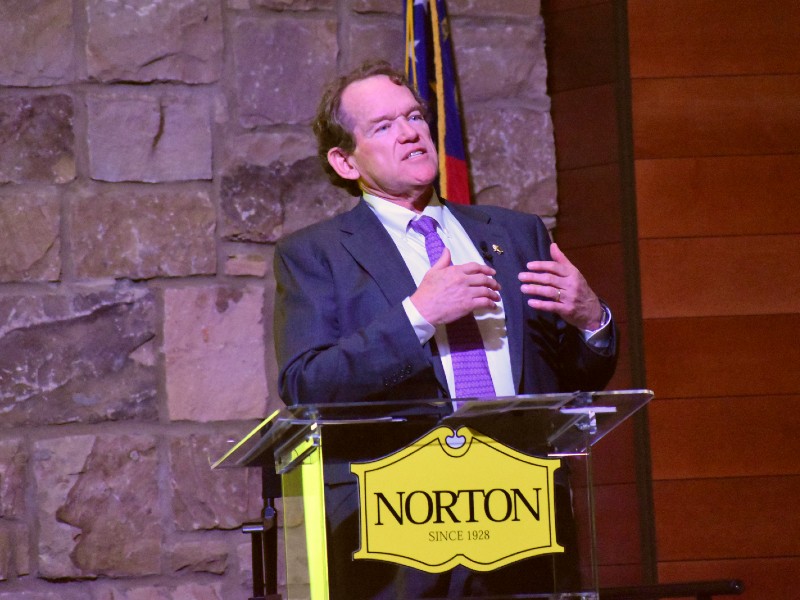Electric vehicles are now at the forefront of automotive innovation, and the so-called "Battery Belt" along Interstate 85 in north Georgia is well positioned to be a part of that boom.
That is the view of real estate executive Frank Norton Jr. in his annual economic forecast called Norton Native Intelligence. He presented the 2023 forecast Thursday evening at the Ramsey Center on the Lanier Technical College campus. It was his 35th annual forecast.
"While E.V. remains an industry in its infancy, it clearly isn't a solution to an undiscovered problem," Norton said. "It is a true solution, and if honed and harvested, it could be able to solve both first and third-world problems."
Norton listed 11 companies in the region that are already making electric vehicle batteries or other components, and he suggested other existing industries, such as Kubota, Fox and Caterpillar, may join them as they expand their electric vehicle lines.
Norton believes as the technology improves, the costs of electric vehicles could come down. At the same time, the amount of time it takes to charge an electric vehicle could drop.
But where is the infrastructure to charge cars every 200 to 300 miles? Norton suggests major changes to the gas station model. He said the landscape will be upended over the coming year and that 43 percent of today's gas stations will disappear by 2050. Those that survive will have to add electric-vehicle charging stations alongside gas and diesel pumps.
"One important aspect is the charging time. Gas fill-ups take a couple of minutes, but E.V. charging takes around 15 to 20 minutes," he said, which would give today's convenience stores that opportunity to evolve into smart community markets.
On the housing market, Norton said local communities are enacting regulations that could have severe consequences on homeownership. He said imposing high impact fees or construction moratoriums to slow development won't allow the market to build needed homes for workers of expanding businesses.
"The reality is that communities must grow to thrive," Norton said. "An ever-changing flow of fresh citizens, industries, retail or population is a strong long-term business strategy and expands community engagement. You can't hide forever. Sometimes you must crawl out of the hole, face the sunlight and face reality."
There are other issues facing the housing industry. As economists speculate on a possible recession, investors, developers and home buyers are proceeding with caution.
"It's mostly a pause to see what happens next," he said. "But the pause is essentially a creative stall in the market or a moratorium on new construction as each waits to see who will blink first."
As of November, closed home sales in North Georgia declined by 38.6 percent with interest rates continuing to climb.
For the 35 years he has compiled this annual forecast, Norton has done most of the work himself. He announced Thursday that he is reducing his role in the forecast and his partner, Tommy Howard, president and CEO of Norton Brokerage Services, will take additional responsibilities with compiling the annual forecast.
"I am not going away," he said. "I plan to remain an active part of the analysis, writing and presenting. … Both Tommy and I will continue to be available to speak on real estate trends and real estate community issues across the state.”
The event concluded with a panel featuring Howard, Vice President and Partner of the Norton Residential Group R. Brad Abernathy and Senior Vice President and Partner of the Commercial & Acreage Division Stephen Lovett.

http://accesswdun.com/article/2023/1/1163632/norton-agency-provides-annual-real-estate-forecast-at-lanier-tech
